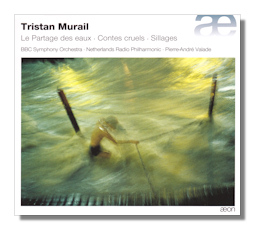
The Internet's Premier Classical Music Source
Related Links
-
Murail Reviews
- Latest Reviews
- More Reviews
-
By Composer
-
Collections
DVD & Blu-ray
Books
Concert Reviews
Articles/Interviews
Software
Audio
Search Amazon
Recommended Links
Site News
 CD Review
CD Review
Tristan Murail

- Le Partage des eaux 1
- Contes cruels 2
- Sillages 3
2 Wiek Hijmans, electric guitar
2 Seth Josel, electric guitar
1 BBC Symphony Orchestra/Pierre-André Valade
2,3 Netherlands Radio Philharmonic Orchestra/Pierre-André Valade
Æon AECD1222
Tristan Murail (born 1947, France) challenges the very basis of how we hear orchestral music. With or without electronics, he advocates – both implicitly and explicitly – a sort of deconstruction of sound so as to reveal the extent to which its fundamental properties are responsible for harmony; this is "spectralism". Murail studied with Messiaen – as did Xenakis. Like the latter, Murail sees the relationships between mathematics, nature, natural sound and music as useful – crucial even – to composition.
The three substantial orchestral works here available on CD for the first time are recent… from 1985 onwards; indeed Contes cruels was completed as recently as 2007. It's for two electric guitars and orchestra. Exploring the acoustic and technical properties of the solo instruments, Contes cruels displays nicely Murail's determination to provide purposeful music in its own right; and not exemplary or "demonstrational" work. Although the sound of the guitars is intriguing to the ear, you're drawn into the progression of the piece, which, like Le Partage des eaux, lasts over 20 minutes. Although neither work tells a story as such, there is no meandering or ruminating in the interests of sound for sound's sake. This is one aspect of the Murail's work that makes him such an attractive composer. In common with composers like Boulez, Harvey and Messiaen, Murail has both this understanding of structure and an avowed adherence to innovation.
Sillages displays Murail's grasp of dynamics as much as his determination to expose harmony through a profound understanding of how sound works. The sand, gravel and rock arranged in gardens in Kyoto turn out to be as much analogs of how sound behaves, as literal inspirations for the music. The viewer or visitor to almost any human "placing" of natural objects such as of flowers, minerals or water must (or, at least, is implicitly invited to) supply either their own perspective (at times, literally) on what they see and experience and/or reposition the object(s) to accord with preconceptions, comfort, understanding. Similarly, Murail relies on what he calls "psychological time": the listener brings their own sense of time to (Murail's) music; memory, anticipation, prediction all become essential in (understanding our) response to music as a temporal entity.
It's clear that musicians and conductor/director Pierre-AndréValade understand these aspects of Murail's work. Not once do they indulge a tendency for the music to be overtly experimental or "open-ended" for all it is clearly exploratory and avant-garde. Lack of conventionality is not a prize in itself. For these performers – as it seems for Murail – it's the music as music, not thesis, that counts. Their playing is based on the same kind of expected acceptance as it would be were they performing Messiaen or Boulez. This does not mean that no quarter is given to Murail's particular construction of music. These three sets of players are obviously proud of approaching less well-known repertoire without fuss. The music is played without needing to include any kind of concession. Most strikingly, it's played as music of beauty and with intense emotion. Sound is paramount. But in the same way as it is in Stravinsky, not Cage.
In their different ways the two orchestras in the hour of music on this excellent CD provide an understanding of why Murail is as influential as he is; and, in a way, why his influence seems likely to increase. Like Esa-Pekka Salonen, Tristan Murail has made the symphony orchestra his own in ways that other composers have not always necessarily chosen to do. It is an instrument in ways similar to those elaborated by the likes of Haydn, Berlioz and Bartók. Considering Murail's understanding of harmony from the "spectral" perspective, the result is both impressive and pleasing.
The booklet in French and English is informative; it contains background and context on Murail, commentary on the works on the CD, and bios of the performers – and composer. The two acoustics used (the famed BBC Maida Vale Studio for Le Partage; the Muziekcentrum van de Omroep in Hilversum, Netherlands for Contes cruels and Sillages) more than do the music justice. They're each ample and responsive; they let the music breathe to its fullest extent. Æon is to be heartily congratulated on this release. There are no other recordings of these works in the current catalog. Indeed, there are but three other CDs at all devoted exclusively to this important composer. Enthusiasts for the more accessible reaches of contemporary orchestral music should have no hesitation.
Copyright © 2015, Mark Sealey





















